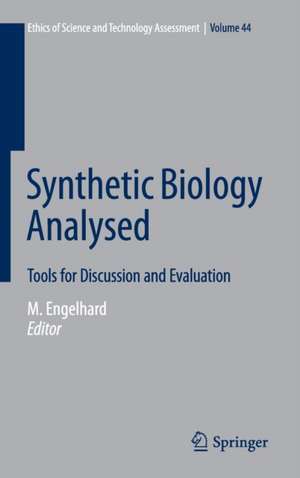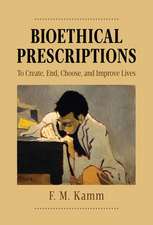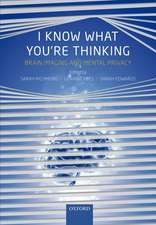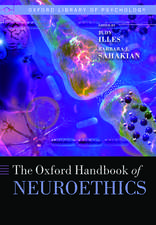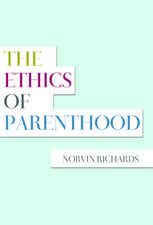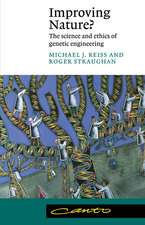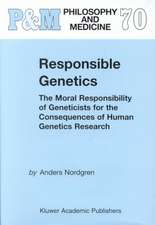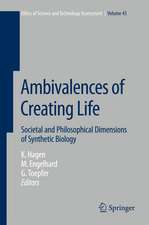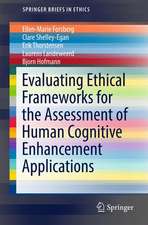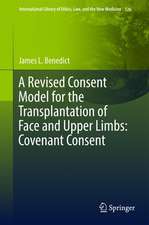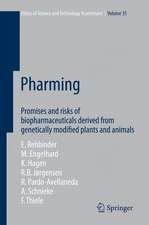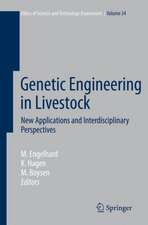Synthetic Biology Analysed: Tools for Discussion and Evaluation: Ethics of Science and Technology Assessment, cartea 44
Editat de Margret Engelharden Limba Engleză Hardback – 25 apr 2016
Synthetic biology is a dynamic, young, ambitious, attractive, and heterogeneous scientific discipline. It is constantly developing and changing, which makes societal evaluation of this emerging new science a challenging task, prone to misunderstandings. Synthetic biology is difficult to capture, and confusion arises not only regarding which part of synthetic biology the discussion is about, but also with respect to the underlying concepts in use. This book offers a useful toolbox to approach this complex and fragmented field. It provides a biological access to the discussion using a 'layer' model that describes the connectivity of synthetic or semisynthetic organisms and cells to the realm of natural organisms derived by evolution.
Instead of directly reviewing the field as a whole, firstly our book addresses the characteristic features of synthetic biology that are relevant to the societal discussion. Some of these features apply only to parts of synthetic biology, whereas others are relevant to synthetic biology as a whole. In the next step, these new features are evaluated with respect to the different areas of synthetic biology. Do we have the right words and categories to talk about these new features? In the third step, traditional concepts like “life” and “artificiality” are scrutinized with regard to their discriminatory power. This approach may help to differentiate the discussion on synthetic biology. Lastly our refined view is utilized for societal evaluation. We have investigated the public views and attitudes to synthetic biology. It also includes the analysis of ethical, risk and legal questions, posed by present and future practices of synthetic biology.
This book contains the results of an interdisciplinary research projectand presents the authors’ main findings and recommendations. They are addressed to science, industry, politics and the general public interested in this upcoming field of biotechnology.
| Toate formatele și edițiile | Preț | Express |
|---|---|---|
| Paperback (1) | 496.15 lei 6-8 săpt. | |
| Springer International Publishing – 22 apr 2018 | 496.15 lei 6-8 săpt. | |
| Hardback (1) | 502.36 lei 6-8 săpt. | |
| Springer International Publishing – 25 apr 2016 | 502.36 lei 6-8 săpt. |
Din seria Ethics of Science and Technology Assessment
- 15%
 Preț: 439.70 lei
Preț: 439.70 lei - 18%
 Preț: 796.13 lei
Preț: 796.13 lei -
 Preț: 392.21 lei
Preț: 392.21 lei -
 Preț: 350.12 lei
Preț: 350.12 lei - 5%
 Preț: 368.00 lei
Preț: 368.00 lei - 20%
 Preț: 709.13 lei
Preț: 709.13 lei -
 Preț: 386.22 lei
Preț: 386.22 lei - 15%
 Preț: 714.02 lei
Preț: 714.02 lei -
 Preț: 478.05 lei
Preț: 478.05 lei -
 Preț: 489.30 lei
Preț: 489.30 lei -
 Preț: 389.70 lei
Preț: 389.70 lei - 15%
 Preț: 469.91 lei
Preț: 469.91 lei - 15%
 Preț: 643.00 lei
Preț: 643.00 lei -
 Preț: 402.98 lei
Preț: 402.98 lei -
 Preț: 393.90 lei
Preț: 393.90 lei -
 Preț: 407.19 lei
Preț: 407.19 lei -
 Preț: 384.86 lei
Preț: 384.86 lei -
 Preț: 386.61 lei
Preț: 386.61 lei -
 Preț: 402.38 lei
Preț: 402.38 lei - 15%
 Preț: 657.73 lei
Preț: 657.73 lei - 18%
 Preț: 747.20 lei
Preț: 747.20 lei - 5%
 Preț: 737.69 lei
Preț: 737.69 lei - 15%
 Preț: 449.83 lei
Preț: 449.83 lei -
 Preț: 384.86 lei
Preț: 384.86 lei - 15%
 Preț: 504.99 lei
Preț: 504.99 lei - 5%
 Preț: 366.70 lei
Preț: 366.70 lei - 5%
 Preț: 724.50 lei
Preț: 724.50 lei - 18%
 Preț: 740.11 lei
Preț: 740.11 lei - 15%
 Preț: 473.49 lei
Preț: 473.49 lei -
 Preț: 405.06 lei
Preț: 405.06 lei
Preț: 502.36 lei
Preț vechi: 591.01 lei
-15% Nou
Puncte Express: 754
Preț estimativ în valută:
96.16€ • 104.48$ • 80.82£
96.16€ • 104.48$ • 80.82£
Carte tipărită la comandă
Livrare economică 21 aprilie-05 mai
Preluare comenzi: 021 569.72.76
Specificații
ISBN-13: 9783319251431
ISBN-10: 3319251430
Pagini: 230
Ilustrații: XVII, 211 p. 3 illus.
Dimensiuni: 155 x 235 x 14 mm
Greutate: 0.5 kg
Ediția:1st ed. 2016
Editura: Springer International Publishing
Colecția Springer
Seria Ethics of Science and Technology Assessment
Locul publicării:Cham, Switzerland
ISBN-10: 3319251430
Pagini: 230
Ilustrații: XVII, 211 p. 3 illus.
Dimensiuni: 155 x 235 x 14 mm
Greutate: 0.5 kg
Ediția:1st ed. 2016
Editura: Springer International Publishing
Colecția Springer
Seria Ethics of Science and Technology Assessment
Locul publicării:Cham, Switzerland
Public țintă
ResearchCuprins
The new worlds of synthetic biology – Synopsis.- A layer model to describe and classify natural and synthetic organisms in different fields of synthetic biology.- Dealing with potential risks of synthetic biology.- The Concept of Life in Synthetic Biology.- An Ethical Response to Synthetic Biology.- Synthetic Biology: Public perceptions of an emergent field.- In Search for a Legal Framework for Synthetic Biology.
Textul de pe ultima copertă
Synthetic biology is a dynamic, young, ambitious, attractive, and heterogeneous scientific discipline. It is constantly developing and changing, which makes societal evaluation of this emerging new science a challenging task, prone to misunderstandings. Synthetic biology is difficult to capture, and confusion arises not only regarding which part of synthetic biology the discussion is about, but also with respect to the underlying concepts in use. This book offers a useful toolbox to approach this complex and fragmented field. It provides a biological access to the discussion using a 'layer' model that describes the connectivity of synthetic or semisynthetic organisms and cells to the realm of natural organisms derived by evolution.
Instead of directly reviewing the field as a whole, firstly our book addresses the characteristic features of synthetic biology that are relevant to the societal discussion. Some of these features apply only to parts of synthetic biology, whereas others are relevant to synthetic biology as a whole. In the next step, these new features are evaluated with respect to the different areas of synthetic biology. Do we have the right words and categories to talk about these new features? In the third step, traditional concepts like “life” and “artificiality” are scrutinized with regard to their discriminatory power. This approach may help to differentiate the discussion on synthetic biology. Lastly our refined view is utilized for societal evaluation. We have investigated the public views and attitudes to synthetic biology. It also includes the analysis of ethical, risk and legal questions, posed by present and future practices of synthetic biology.
This book contains the results of an interdisciplinary research projectand presents the authors’ main findings and recommendations. They are addressed to science, industry, politics and the general public interested in this upcoming field of biotechnology.
Caracteristici
Concentrates on the societal discussion about synthetic biology Scrutinizes traditional concepts such as "life" or "artificial" Leads to a refined view for societal, particularly ethical, evaluation Includes supplementary material: sn.pub/extras
